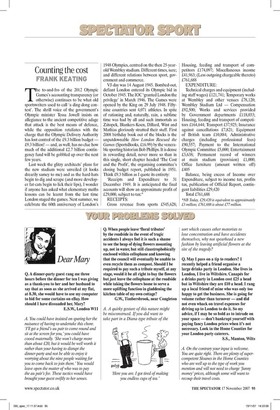Counting the cost
FRANK KEATING The to-and-fro of the 2012 Olympic Games's accounting transparency (or otherwise) continues to be what old sportswriters used to call 'a ding-dong contest'. The shrill voice of the government's Olympic minister Tessa Jowell insists on allegiance to the ancient competitive adage that attack is the best means of defence, while the opposition retaliates with the charge that the Olympic Delivery Authority has lost control of the £9.3 billion budget — £9.3 billion! — and, as well, has no clue how much of the additional £2.7 billion contingency fund will be gobbled up over the next few years.
Last week the glitzy architects' plans for the new stadium were unveiled (it looks drearily samey to me) and as the hard-hats begin to dig and scrape (and more developer fat-cats begin to lick their lips), I wonder if anyone has asked what elementary maths lessons can be learnt from the last time London staged the games. Next summer, we celebrate the 60th anniversary of London's 1948 Olympics, centred on the then 25-yearold Wembley stadium. Different times, sure; and different relations between sport, government and commerce.
VJ-day was 14 August 1945. Bombed-out, defiant London entered its Olympic bid in October 1945. The IOC 'granted London the privilege' in March 1946. The Games were opened by the King on 29 July 1948. Fiftynine countries sent 4,071 athletes. In spite of rationing and, naturally, rain, a sublime time was had by all and such immortals as Zatopek, Blankers-Koen, Dillard, Wint and Mathias gloriously strutted their stuff. First 2008 birthday book out of the blocks is the unputdownable How London Rescued the Games (SportsBooks, £16.99) by the venerable sporting historian Bob Phillips It is dense in rewarding detail, never more so than in this single, short chapter headed 'The Cost and the Profit', the organising committee's closing budget report, published in 1951. Think £9 3 billion as I quote its entirety: 'Receipts and Expenditure to 31 December 1949. It is anticipated the final accounts will show an approximate profit of £29,000, subject to tax:* RECEIPTS: Gross revenue from sports £545,628; Housing, feeding and transport of competitors £174,097; Miscellaneous income £41,963; (Less outgoing chargeable thereto) £761,688 EXPENDITURE: Technical charges and equipment (including staff wages) £121,741; Temporary works at Wembley and other venues £78,120; Wembley Stadium Ltd — Compensation £92,500; Works and services provided by Government departments £118,033; Housing, feeding and transport of competitors £164,644; Transport £37,925; Insurance against cancellations £7,821; Equipment of British team £10,884; Administrative charges (including professional fees) £90,557; Payment to the International Olympic Committee £5,000; Entertainment £3,638; Permanent record of winners at main stadium (provision) £1,000; Office furniture (amount written off) £405 Balance, being excess of Income over Expenditure, subject to income tax, profits tax, publication of Official Report, contingent liabilities £29,420 Total £761,688 *NB Today, £29,420 is equivalent to approximately £3 million; £761,688 is about £77 million.




































































 Previous page
Previous page